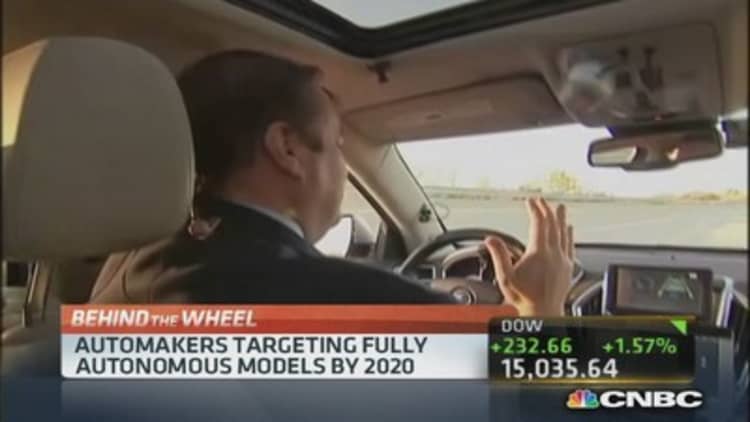As automakers around the world race to develop autonomous drive vehicles, new research is giving automakers both good news and potentially troubling news about self-driving cars.
The good news: Americans like the idea of self-driving cars. In fact, they appear willing to pay a premium for the technology.
The bad news: Car buyers think tech firms like Google will do a better job than traditional automakers building self-driving cars.
(Read more: Hot Trend in Automobiles: Not Owning One)
"Consumers would be willing to buy a self-driving car from leading technology companies even more so than your traditional automotive companies," said Gary Silberg, with the consulting firm KPMG. Silberg's auto research team conducted focus groups across the country where people were asked a series of questions about self-driving cars.
Google Car Top Pick

Three years after Google first showed the autonomous drive car it was developing, the tech firm's test car has left a lasting impression on Americans. In fact, when KPMG asked people which automaker or tech company they would buy a self-driving car from, the top answer was Google.
"When people talk about self-driving cars the number one vehicle they talk about is the Google car," said Silberg "They (Google) have gotten ahead of all the traditional OEM's (automakers) on this topic."
(Read more: Google Futurist: Driverless Cars on Track)
So far, Google hasn't made any plans to get into vehicle manufacturing and how it plans to someday license or sell its technology remains unclear.
However, the fact Google is listed above Toyota, General Motors, Nissan or other automakers shows the public sees self-driving cars more like tech gadgets.
Auto consultants say that distinction will likely change as automakers gradually roll out autonomous drive features over the next 5-6 years.
Buyers Willing to Pay More
The KPMG focus groups also found Americans are willing to pay more for cars that steer themselves and control the speed without the driver having to be actively working the controls.
(Read more: Driverless cars coming, but consumers not ready yet)
When KPMG asked people how much more they would pay for an autonomous drive car, KPMG found most people are willing to pay 20-25 percent more. "The data came back loud and clear, and more over the older folks we talked to were willing to pay more of a premium, in one case 40 percent or 50 percent more," said Silberg
The focus groups show why nearly every auto company is developing autonomous drive technology. If it can be proven to be safe and reliable, and some autonomous drive features in cars already meet that standard, buyers will pay for the technology.
—By CNBC's Phil LeBeau. Follow him on Twitter @LeBeauCarNews.
Questions? Comments? BehindTheWheel@cnbc.com.


